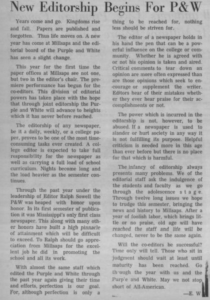by Garrett Coble
opinions editor
It seems the pot has been stirred.
First, to be clear, I am a man. However, I also have a mother, girlfriend, grandmother and enough female friends to care about how society treats people of both genders. I am also a writer, and most of the Purple and White’s readers (as well as anyone who associates with me daily) know I love nothing more than to point out the ludicrousness of certain norms and rituals we take as given standards.
In a previous piece entitled “Your Whiskey Should Taste Like Whiskey: An Essay on Manliness,” this satirical bend focused on certain standards of manliness—and it seems to have ruffled a few feathers, as evidenced by Grace Williams’ response, which you can read here. While I have several issues with the response and with a culture that breeds such whistleblowing behavior, I will applaud Grace Williams for creating a discussion regarding something she disagreed with, rather than complaining in the cafeteria and classroom while taking no action. In addition, there is no denying she put intellect and effort into the piece.
However, shoehorning this discourse into a response to a piece of satire undermines the credibility of her position. Williams accuses Dave Barry and writers of similar pieces (including myself) as simplifying satire into unfunny, sexist humor. At this contention, I raise the question of marginal benefit and marginal cost—if my piece is lowbrow humor begging for the cheap laugh, what gain can be gained by stooping to respond to it? I also question what says more about our society’s place on the matter: the original piece or that someone felt a need to respond? To paraphrase George Carlin, no one is taken less seriously than the one who takes him or herself too seriously. At the end of the day, if my original piece is simplified and crude, it does not make sense to apply an intellectual critique to crude humor.
However, if my piece is read as intended, as an intellectual piece raising up these ridiculous standards to derive humor and bring norms into question, what does one gain by throwing accusations of sexism around? To criticize the piece for championing the very standards it contends are folly illustrates a failure of the reader’s comprehension rather than of the writing. Undoubtedly, some readers will only read it on the superficial joke level without looking at the deeper meaning, but writers cannot be held responsible for lacking comprehension—after all, some people believe Satan is the hero of “Paradise Lost.”
Unfortunately, watching the media and participating in academia has shown me that a career can be made from marauding through libraries and film collections, liberally applying labels such as sexism, racism and homophobia. I’m not saying all media should be free of these labels and condemnation; writers participating in hurtful discourse undermine the profession and, more importantly, hurt people. Yet, the same token applies to those shouting claims of sexism, racism and homophobia. Falsely flagging a work as discriminatory cheapens true struggles against discrimination—such as the kind of true gender inequality which Michelle Byrom faces today.
Sure, political correctness offers many positives. Standards must be enforced to protect from societal regression at the hands of bigots. However, our current level of correctness constrains writers, especially those discussing culture and societal norms. I’d be hard-pressed to write any serious piece, especially in the form of satire, without offending someone. The box is simply too restrictive to move in. It encourages fluff writing, designed only to be inoffensive to all. Of course, I always seriously consider whether any “innocents” will be offended by my words, and I take measures to keep from hurting people unrelated to the matter of the article. However, sometimes toes need to be stepped on to bring into focus some of the ridiculous standards of society. Sometimes, the cage needs to be rattled.
Furthermore, our trigger-happy “-ism” culture hides behind the infallibility of political correctness standards. Put another way, anything that strays from this correctness is immediately met with the hateful labels of racist, homophobic or sexist—often, whether or not it deserves such labels. Intelligent discussion betters nearly everything in life, but these standards are beyond reproach of such intellectual discussion. Once again, I do not group truly ignorant views under intellectual discussion. A time and place undoubtedly exists for labels such as sexist, racist, or homophobe. Yet, our views on sex, race and sexuality must be fluid to keep them pertinent to our evolving culture—and this must be done by accepting and contemplating critiques rather than discounting intelligent dissent as close-mindedness.
I must also disagree with Williams’ insistence on empowering people and “creating comedy that’s original, clever and funny for everyone.’’ Unfortunately, I—and those who write for this section—am under no requirement to empower anyone, but rather state my opinions in a thoughtful way to either create a discussion or provide valuable input to an existing discussion. Often, these opinions take the form of satire, the nature of which lends itself to offending someone.
In closing, I see value in Williams’ piece, but think the execution fell short of the mark. The amount of gymnastics done to connect her accusations to the actual content of the satirical piece undermined her content. After all, were the actions of Lewis and Clark against Native American pertinent to my using them in a navigation joke, or was that snippet included as an intellectual “backscratching” and flaunt of intelligence? Statements such as that exemplify the whistleblowing I delineated earlier; condemnation without need or value added.
But then again, these are just my simplified opinions.
